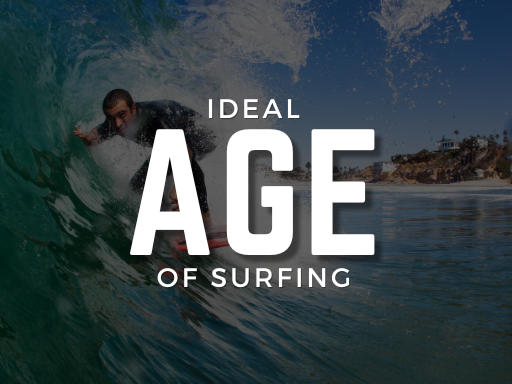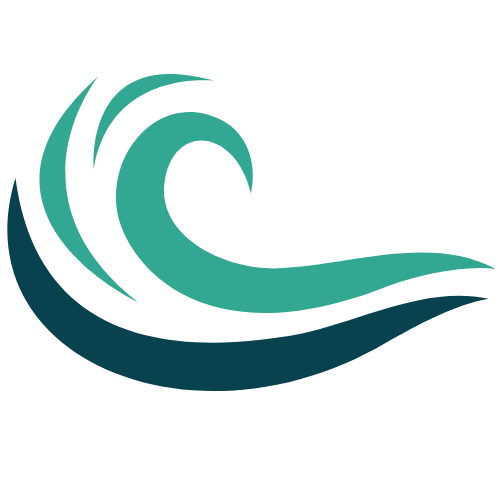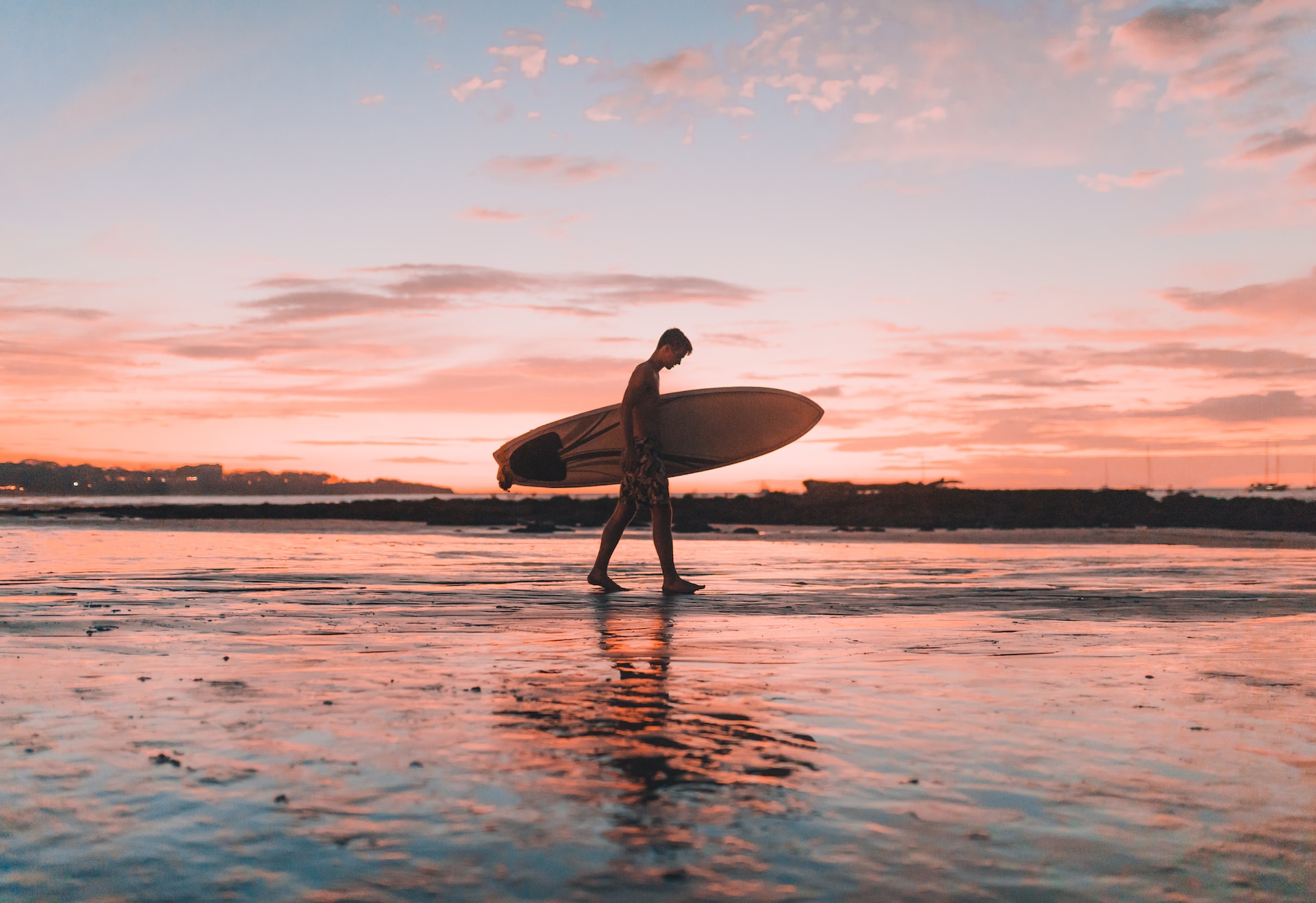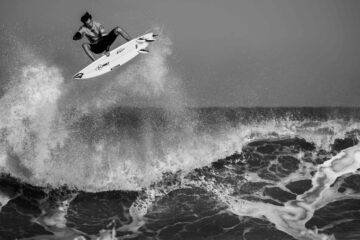Are you wondering How long does it take to learn how to surf? This question intrigues many beginners. Learning to surf typically takes 1-2 lessons for basics and about a week for advanced beginner skills, with consistent practice and good equipment.
Surfing, a blend of skill, balance, and patience, varies in learning time for each person. Here’s a simple guide:
- Fitness level: Better fitness can mean quicker learning.
- Age: Younger learners may pick up skills faster.
- Water confidence: Being at ease in the ocean helps.
Keep it simple, stay patient, and enjoy the ride. Let’s uncover the secrets of surfing and how long it truly takes to become a skilled surfer.
The Basics of Surfing: What to Expect in the Beginning
Surfing starts with excitement and a bit of challenge. Whether you’re a beginner or a pro, understanding the basics is key. Let’s dive into what you should expect at the start of your surfing journey.
First Steps in Learning to Surf
When you begin, focus on these:
- Understanding the Ocean: Learn about waves, tides, and currents. Knowing the ocean helps you surf safely.
- Choosing the Right Equipment: Start with a larger, stable board. It makes balancing easier.
- Basic Techniques: Learn to paddle, pop up, and balance on the board. These are your foundation skills.
- Safety First: Understand surfing etiquette and safety rules. This keeps you and others safe in the water.
Time Frame for Mastering Basic Skills
How long does it take to get these basics down? It varies, but here’s a general idea:
- Paddling: This can take a few hours to get comfortable with. It’s about technique, not just strength.
- Standing Up (Pop Up): This might take a few days to a week. Practice is key.
- Riding Small Waves: Expect to spend a few days to a couple of weeks mastering this.
- Consistency: Surf regularly. The more you practice, the quicker you’ll improve.
Remember, every surfer’s journey is unique. Patience and practice are your best tools. Enjoy the ride and the learning process.
Factors Influencing Your Surf Learning Timeline
Starting to surf is an adventure. It’s about more than just catching waves. Let’s explore the basics every surfer should know.
Physical Fitness and Its Impact
Fitness matters in surfing. Good strength and stamina help you paddle stronger and stay longer in the water. Core strength is crucial for balance on the board. Regular exercise can improve your surfing skills faster.
The Role of Previous Board Sports Experience
Experience in sports like skateboarding or snowboarding can be a plus. They teach balance and board control. This can make learning to surf easier. But remember, ocean waves add a new challenge.
Importance of Wave Quality and Consistency
Good waves make learning easier. Consistent, gentle waves are best for beginners. They offer a safe environment to practice basic skills. Surfing in different wave conditions helps you learn faster.
The Right Equipment (Choosing Your Surfboard and Gear)
Your surfboard is key. Beginners should start with a larger, more stable board. It makes learning to paddle, pop up, and balance easier. Also, invest in a good wetsuit for comfort and safety.
Opportunity and Access to Surf Spots
Access to surf spots is important. The more you can surf, the better you get. If you live near the coast, try to surf regularly. If not, plan trips to surf spots when possible.
Personal Commitment and Practice Frequency
Commitment is everything. Surf as often as you can. Regular practice builds your skills and confidence. Remember, even small, regular sessions can lead to big improvements.
Surfing is a journey. It combines fitness, skill, and a love for the ocean. Start with the right gear, practice regularly, and embrace every wave. Happy surfing!

Is There an Ideal Age to Start?
Many people ask, “What’s the best age to start surfing?” The answer is simple: there’s no perfect age. Surfing suits all ages. Let’s look at how age affects learning speed in surfing.
Analyzing Age as a Factor in Learning Speed
- Young Children: Kids as young as five can start surfing. They learn quickly because they are fearless and flexible. But, they need close supervision for safety.
- Teenagers: Teens often pick up surfing fast. They have good balance, strength, and a sense of adventure. This age is ideal for developing advanced surfing skills.
- Adults: Adults can learn surfing too. They might need more time to get comfortable in the water. Patience and persistence are key. Fitness level, more than age, affects their learning speed.
- Older Adults: Age is just a number. Older adults can enjoy surfing if they are in good health. They might need to focus more on safety and take it slow.
Start at any age, practice regularly, and enjoy the waves. Surfing is for everyone.
Common Challenges for Beginners
Every beginner surfer faces challenges. It’s part of learning. Understanding these challenges helps you overcome them. Let’s explore common issues and how to tackle them.
Common Issues Faced by New Surfers
- Fear of Waves: Many beginners fear large waves. Start small. Practice in smaller waves to build confidence.
- Struggling with Balance: Balance is key in surfing. Improve it with core exercises and yoga.
- Paddling Difficulty: Paddling can be tiring. Build your upper body strength with swimming or rowing.
- Wipeouts: Wipeouts are normal. Learn safe falling techniques to avoid injuries.
- Reading Waves: Understanding waves takes time. Watch experienced surfers and learn from them.
- Crowded Spots: Crowded spots can be intimidating. Try less crowded times or spots for practice.
Tips for Faster Improvement
- Regular Practice: Surf as often as you can. Consistency improves skills.
- Surf Lessons: Consider professional lessons. They provide structured learning.
- Watch and Learn: Observe skilled surfers. Learn from their techniques.
- Stay Fit: Maintain good physical fitness. It helps in surfing.
- Patience: Be patient with your progress. Surfing takes time to learn.
- Enjoy the Process: Remember to have fun. Enjoyment is key in surfing.
Tackle these challenges step by step. Stay committed, practice regularly, and enjoy every moment in the water. Surfing is a journey, enjoy the ride!
FAQs
How Often Should I Practice to Improve My Surfing Skills?
To improve quickly, surf at least two to three times a week. Consistent practice in various wave conditions helps develop skills faster. Balance this with rest and cross-training.
How Long Does It Take to Become an Intermediate Surfer?
Becoming an intermediate surfer typically takes about one to two years. This time frame depends on how often you surf and your dedication to learning and practicing new techniques.
How Long Does It Take to Learn to Surf in the Ocean?
Learning to surf in the ocean can take a few days to a few weeks for the basics. Mastery of these skills varies based on individual effort, wave conditions, and consistency in practice.
Final Words
The journey of learning to surf from novice to pro is as diverse as the waves themselves. There’s no one-size-fits-all answer to how long it takes, but with dedication, practice, and the right mindset, anyone can ride the waves and become a skilled surfer.
Remember, it’s not just about catching waves; it’s about embracing the adventure and enjoying every moment in the water. Happy surfing!





[…] By learning from experienced surfers, respecting etiquette, and choosing appropriate gear and waves, beginners can avoid being labeled as kooks. Embracing humility and a willingness to learn are key to a rewarding surfing journey. […]
[…] Surfing requires a waxed board. Without wax, surfers slip off. Wax creates friction between feet and board. It’s like glue for your feet but safe for the ocean. Before you start, know the water temperature. […]
[…] Is Surfing Hard? Many people think so. Surfing involves balance, strength, and patience. Imagine standing on a board while waves move under you. It’s a skill that takes time to master. […]
[…] Starting your surfing journey is thrilling. But before you hit the waves, you need the right gear. The right equipment can make learning easier and safer. Here’s what you need to get started. […]